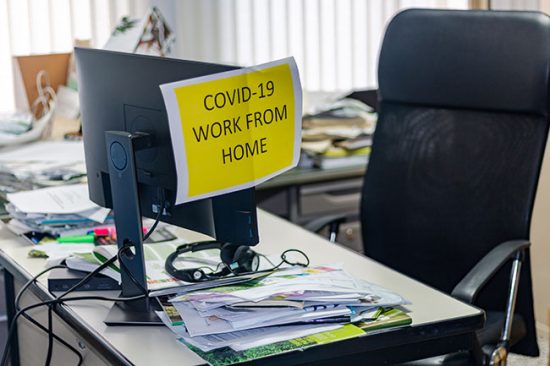
Remote work’s effect on OH&S policy considerations
December 16, 2020
By
Jason Mandlowitz
Employers should consider implementing remote work policy

Remote work has challenged the very foundation of occupational health and safety, writes Jason Mandlowitz. (RON/Adobe Stock)
COVID-19 has revolutionized workplace occupational health and safety in many ways.
By necessity, non-essential work has been shifted to remote locations and work-from-home arrangements. This has challenged the very foundation of occupational health and safety.
The “internal responsibility system” emphasizes the engagement of all of the workplace parties who work collaboratively to ensure a healthy and safe workplace, compliant with legislative and regulatory obligations.
With COVID-19 and the need for remote work, many of the workplace’s established “normal” policies and procedures have been interrupted. The new normal is the “external responsibility system.”
New medical challenges
COVID-19 brings with it new medical challenges. It has been well documented that COVID-19 infection is not limited to short-term health issues which may resolve after a period of treatment and quarantine.
Longer-term health issues have emerged. Conditions similar to chronic fatigue syndrome and fibromyalgia have also been diagnosed. Significant mental health reactions resembling post-traumatic stress syndrome have widely been reported.
Since March 2020, there has been an explosion of medical journal articles seeking to better understand COVID-19 and these residual conditions, so much so that the terms “post-COVID syndrome” or “post-viral syndrome” have found there way into medical lexicon.
Workplace health and safety policies face a dual challenge: addressing new work arrangements and medical conditions.
Introducing remote work policies
Remote work will likely not end soon.
To be prepared for what appears to be a long-term change in employment arrangements, there are a number of initiatives employers should take.
If not already in place, employers should introduce a remote work policy. This can be part of the existing OH&S program or a separate initiative.
Gathering information about worker intentions and future needs is a starting point which can easily be facilitated through a COVID-19 survey.
To co-ordinate this effort and to signal the organization’s commitment to health and safety, it is recommended that a remote work task force be established, including all levels of management and employees. In unionized organizations, the joint health and safety committee should be included.
The remote work policy should establish clear criteria for remote work arrangements to ensure both the health and safety of employees, and comply with government legislation and regulations.
Employers must ensure that the COVID-19 policy has been communicated to employees and that it is accessible.
Prior to the commencement of a remote work arrangement, all involved must be trained on general and issue-specific health and safety measures.
Criteria may include, but would not be limited to:
- employer, manager/supervisor, and employee roles and responsibilities
- clear hours and location of work
- service standards, including deliverables and response time
- eligibility for remote work, including a segregated remote work location, ergonomic standards, smoke/carbon monoxide detectors, electrical capacity certification, unobstructed exists, multiple egress points, fire extinguishers
- provision and ownership of remote work machinery and equipment
- requirements for the use and ownership of work computers, mobile devices, vehicles, safety equipment (fire extinguisher, first aid kit, emergency supplies)
- personalized, single-location hazard assessments and emergency plans
- confidentiality and privacy pertaining to business and/or personal information
- liability and insurance for the employer and the remote location
- compliance with government zoning and other laws.
Employers need to be prepared for inevitable return of government workplace inspections.
Where an employer approves remote work, it should be expected that the location will meet the legislative definition of a “workplace” and that all applicable legislation and regulations apply.
To ensure compliance, it is recommended that the remote work policy addresses the nature, scheduling and responsibility for remote work location inspections.
Will it be a management representative, supervisor(s), member of the remote work task force, or an independent third party?
Human resource policy
As a workplace, other employer human resources and labour relations policies also apply.
The remote work arrangement is an essential part of the contract of employment. Accordingly, remote workers should be expected to sign an agreement confirming compliance with the remote work policy and recognizing inclusion in the workplace employment performance management system.
Further, employers need to recognize and prescribe how absenteeism will be addressed.
- How and in what form will the current workplace absence management program apply?
- How and in what form will the employer’s progressive discipline policy apply?
- How will occupational injuries/illness and non-occupational conditions be addressed?
- How will sick days and vacation days accrued by workers apply to COVID-19 type exposures?
- Will the workplace introduce an expanded sick day policy to cover the period of quarantine for a worker who may have contracted the coronavirus?
A significant challenge facing workplaces will be understanding and addressing post-COVID-19 symptomology.
Many employers offer their employees free access to an employee assistance program.
Another option which has surfaced during these challenging times to facilitate early intervention — especially for mental health issues — is an employer-funded medical retainer relationship with qualified, independent health-care practitioners with COVID-19 experience.
Jason Mandlowitz is president of Mandlowitz Consulting and Paralegal Services in London, Ont.